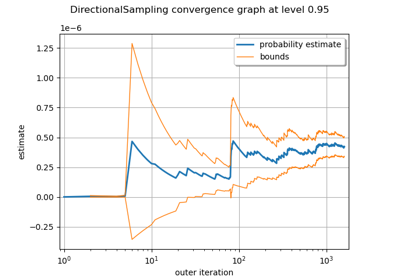MediumSafe¶
- class MediumSafe(*args)¶
MediumSafe method.
- Available constructors:
MediumSafe(solver=ot.Brent())
MediumSafe(solver, maximumDistance, stepSize)
- Parameters:
- solver
Solver Non linear solver used to research the intersection of the limit state function with the direction, on each segment of length stepSize, between the center of the space and maximumDistance (root research).
- maximumDistancepositive float
Distance from the center of the standard space until which we research an intersection with the limit state function along each direction. By default, the maximum distance is equal to the value defined through the key RootStrategyImplementation-DefaultMaximumDistance of the
ResourceMap.- stepSizefloat
Length of each segment inside which the root research is performed. By default, the step size is equal to the value defined through the key RootStrategyImplementation-DefaultStepSize of the
ResourceMap.
- solver
See also
Notes
The MediumSafe strategy is the following: for each direction, we go along the direction by step of length stepSize from the origin to the maximum distant point (at distance maximumDistance from the center of the standard space) and we check whether there is a sign changement on each segment so formed.
At the first sign changement, we research one root in the concerned segment with the selected non linear solver. Then, the segment [root, maximum distant point] is considered within the failure space.
If stepSize is small enough, this strategy guarantees us to find the root which is the nearest from the origin.
Methods
Accessor to the object's name.
getId()Accessor to the object's id.
Get the maximum distance.
getName()Accessor to the object's name.
Get the origin value.
Accessor to the object's shadowed id.
Get the solver.
Get the step size.
Accessor to the object's visibility state.
hasName()Test if the object is named.
Test if the object has a distinguishable name.
setMaximumDistance(maximumDistance)Set the maximum distance.
setName(name)Accessor to the object's name.
setOriginValue(originValue)Set the origin value.
setShadowedId(id)Accessor to the object's shadowed id.
setSolver(solver)Set the solver.
setStepSize(stepSize)Set the step size.
setVisibility(visible)Accessor to the object's visibility state.
solve(function, value)Give all the roots found applying the root strategy.
- __init__(*args)¶
- getClassName()¶
Accessor to the object’s name.
- Returns:
- class_namestr
The object class name (object.__class__.__name__).
- getId()¶
Accessor to the object’s id.
- Returns:
- idint
Internal unique identifier.
- getMaximumDistance()¶
Get the maximum distance.
- Returns:
- maximumDistancepositive float
Distance from the center of the standard space until which we research an intersection with the limit state function along each direction. By default, the maximum distance is equal to the value defined through the key RootStrategyImplementation-DefaultMaximumDistance of the
ResourceMap.
- getName()¶
Accessor to the object’s name.
- Returns:
- namestr
The name of the object.
- getOriginValue()¶
Get the origin value.
- Returns:
- originfloat
Value of the limit state function at the center of the standard space.
- getShadowedId()¶
Accessor to the object’s shadowed id.
- Returns:
- idint
Internal unique identifier.
- getSolver()¶
Get the solver.
- Returns:
- solver
Solver Non linear solver which will research the root in a segment.
- solver
- getStepSize()¶
Get the step size.
- Returns:
- stepSizefloat
Length of each segment inside which the root research is performed. By default, the step size is equal to the value defined through the key RootStrategyImplementation-DefaultStepSize of the
ResourceMap.
- getVisibility()¶
Accessor to the object’s visibility state.
- Returns:
- visiblebool
Visibility flag.
- hasName()¶
Test if the object is named.
- Returns:
- hasNamebool
True if the name is not empty.
- hasVisibleName()¶
Test if the object has a distinguishable name.
- Returns:
- hasVisibleNamebool
True if the name is not empty and not the default one.
- setMaximumDistance(maximumDistance)¶
Set the maximum distance.
- Parameters:
- maximumDistancepositive float
Distance from the center of the standard space until which we research an intersection with the limit state function along each direction. By default, the maximum distance is equal to the value defined through the key RootStrategyImplementation-DefaultMaximumDistance of the
ResourceMap.
- setName(name)¶
Accessor to the object’s name.
- Parameters:
- namestr
The name of the object.
- setOriginValue(originValue)¶
Set the origin value.
- Parameters:
- originfloat
Value of the limit state function at the center of the standard space.
- setShadowedId(id)¶
Accessor to the object’s shadowed id.
- Parameters:
- idint
Internal unique identifier.
- setSolver(solver)¶
Set the solver.
- Parameters:
- solver
Solver Non linear solver which will research the root in a segment.
- solver
- setStepSize(stepSize)¶
Set the step size.
- Parameters:
- stepSizefloat
Length of each segment inside which the root research is performed. By default, the step size is equal to the value defined through the key RootStrategyImplementation-DefaultStepSize of the
ResourceMap.
- setVisibility(visible)¶
Accessor to the object’s visibility state.
- Parameters:
- visiblebool
Visibility flag.
- solve(function, value)¶
Give all the roots found applying the root strategy.
- Parameters:
- function
Function Function from
to
along the ray, a linear function along the direction.
- valuefloat
- function
- Returns:
- roots
ScalarCollection All the roots found applying the root strategy.
If
SafeAndSlow: all the real valuessuch as function(x) = value researched in each segment of length stepSize, within [origin, maximumDistance].
If
RiskyAndFast: the real valuesuch as function(x) = value researched within [origin, maximumDistance].
If
MediumSafe: the real valuesuch as function(x) = value researched the first segment of length stepSize, within [origin, maximumDistance] where a sign changement of function has been detected.
- roots
Examples using the class¶

Use the Adaptive Directional Stratification Algorithm
 OpenTURNS
OpenTURNS
